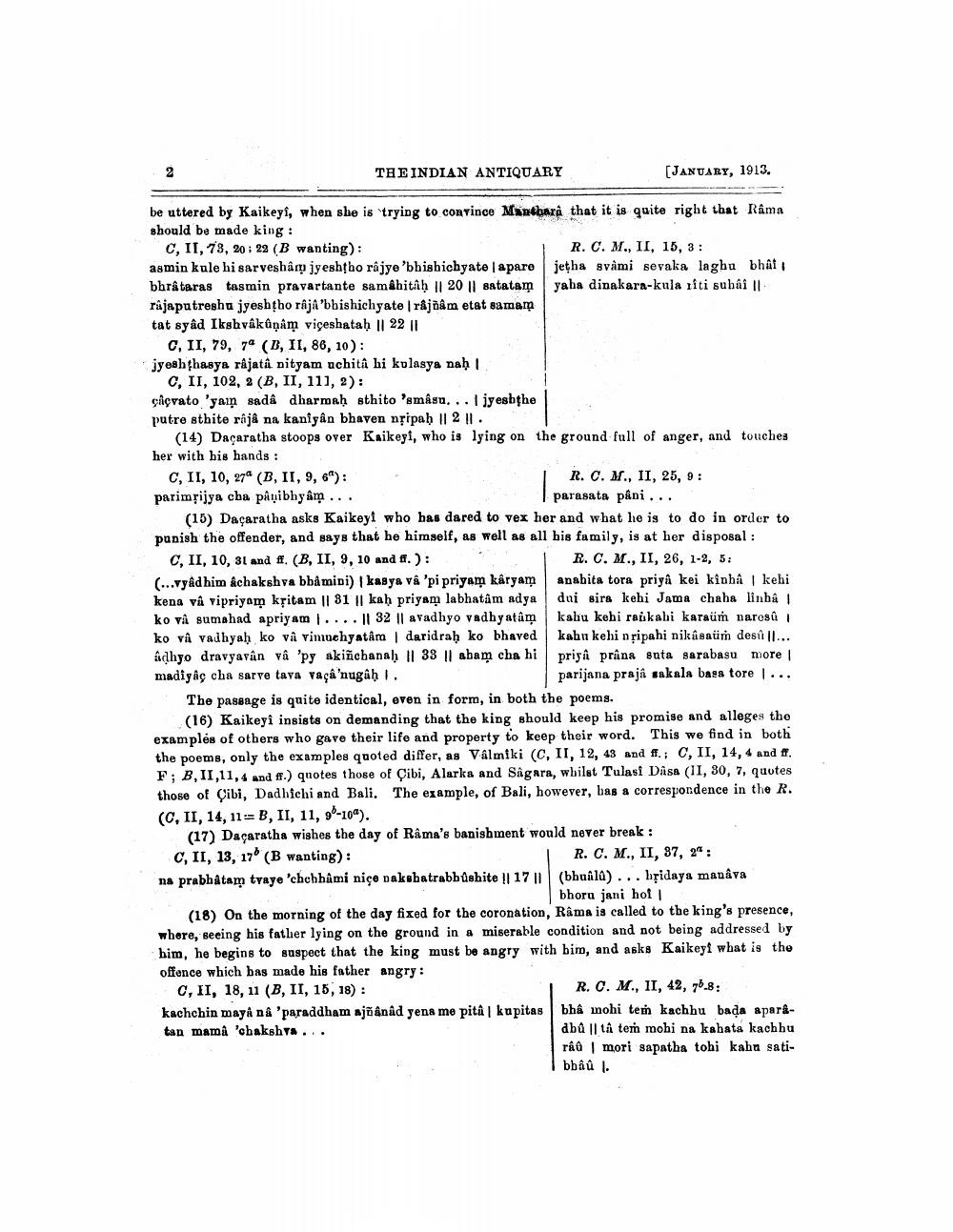________________
2
THE INDIAN ANTIQUARY
[JANUARY, 1913.
be uttered by Kaikeyî, when she is trying to convince Manthara that it is quite right that Rama should be made king : C, II, 73, 20; 22 (B wanting):
R. C.M., II, 15, 3: asmin kule hi sarveshâmjyeshtho rajye'bhishichyate apare | jetha svâmi sevaka laghu bhat bhrataras tasmin pravartante samáhitah || 20 satatam yaba dinakara-kula iti subai II rájaputreshajyeshțho râja'bbishichyate | rajnám etat samar tat syâd Ikshvakuņam viceshatah 11 22 11
C, II, 79, 74 (B, II, 86, 10): jyeshghasya rajata nityam achita hi kulasya nah
C, II, 102, 2 (B, II, 111, 2): cicvato 'yain sadê dharmaḥ sthito 'smagu... 1 iyesbthe putre sthite râjâ na kaniyan bhaven nipah II 211
(14) Daçaratha stoops over Kaikeyi, who is lying on the ground full of anger, and touches her with his hands : C, II, 10, 274 (B, II, 9, 64):
R. C.M., II, 25, 9: parimrijga cha påvibhyam...
parasata pâni ... (15) Daçaratha asks Kaikeyi who has dared to vex her and what he is to do in order to punish the offender, and says that he himself, as well as all his family, is at her disposal : C, II, 10, 31 and #. (B, II, 9, 10 and f.):
1 R. C.M., II, 26, 1-2, 5: (...vyâd him kchakshva bbâmidi) kagya va 'pi priyam kâryamanabita tora priya kei kinha | kehi kena va vipriyor kritam || 81 || kah priyam labhatam adya dui sira kehi Jama chaba linha ko va sumahad apriyam .... 11 32 || avadhyo vadhy atâm kahu kebi raikahi karaür naresů ko vî vadhyah ko va vimuchyatâm daridrah ko bhaved kahu kehi nripahi nikâbaür desû ll... adhyo dravyavân vâ 'py akiñcbanah 11 33 ll abam cha hi priya prána suta sarabasu more! madiyaç cha sarve tava façâ'nugâh I.
parijana prajâ sakala baga tore ... The passage is quite identical, even in form, in both the poems.
(16) Kaikeyi insists on demanding that the king should keep his promise and alleges the examples of others who gave their life and property to keep their word. This we find in both the poems, only the examples quoted differ, as Valmiki (C, II, 12, 43 and ff.; C, II, 14, 4 and ff. F; B, II,11,4 and ff.) quotes those of Cibi, Alarka and Sagara, wbilet Tulasi Dasa (11, 80, 7, quotes those of Cibi, Dadhichi and Bali. The example, of Bali, however, has a correspondence in the R. (C, II, 14, 11:= B, II, 11, 90-10).
(17) Daçaratha wishes the day of Rama's banishment would never break : C, II, 13, 170 (B wanting):
1 R. C. M., II, 37, 2“: na prabhatam traye 'chchhami nice nakshatrabhúshite !| 1711(bhuald) ... hřidaya manava
bhoru jani hof (18) On the morning of the day fixed for the coronation, Râma is called to the king's presence, where, seeing his father lying on the ground in a miserable condition and not being addressed by him, he begins to suspect that the king must be angry with him, and asks Kaikeyi what is the offence which bas made his father angry: C, II, 18, 11 (B, II, 15, 18) :
R. C. M., 11, 42, 70-8: kachchin maya na 'paraddham ajõânâd yena me pita kupitas
bhá mnohi te kachhu bada aparatan mama 'chakshya ...
dba || tâ teṁ mobi na kabata kachbu râû mori sapatha tohi kaha satibbî û




